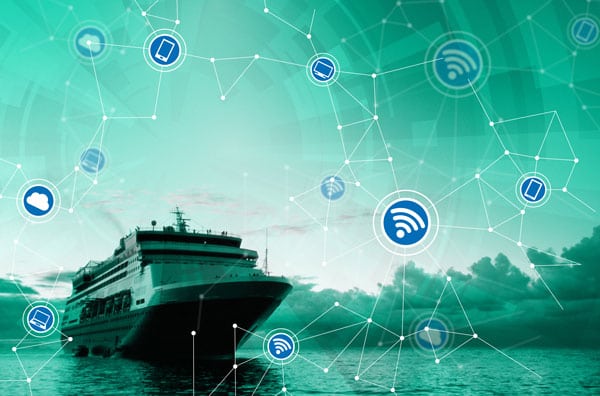Maritime Connectivity Stats Take Stock of 2021 Growth

Photo: Via Satellite
The maritime connectivity market continues to evolve, and maritime revenue for VSAT service increased sharply up in 2021 over 2020. Crew welfare and passenger satisfaction are key drivers of connectivity adoption, and the sale price for VSAT antennas also increased. Valour Consultancy is due to release its 2022 edition of its flagship maritime report in the coming weeks. Here are some headline statistics from this year’s research about the changing maritime connectivity market in 2021.
In 2021, more than 39,700 vessels worldwide were equipped with very small aperture terminals (VSATs), with the associated airtime revenues for those vessels estimated at $1.263 million. In addition to that, vessels with high-speed and voice L-band services totalled more than 47,300 and nearly 80,000 vessels on low-speed/no voice services were active in 2021. Aggregated service charges reached $432 million in the same period.
Combined annual revenues of VSAT and L-band amounted to $1.685 million in 2021, a 42% jump up from 2020. This beat Valour’s previous projection of 17% growth over 2020.
Inmarsat Fleet Xpress (FX) is now active on 11,500 vessels. Inmarsat had more than 11,500 vessels on its FX platform by the end of 2021 and Valour Consultancy projects a strong possibility this will reach more than 14,000 vessels globally by the end of 2022. Service providers operating as value-added resellers for the satellite operator are now installing more vessels than Inmarsat’s direct retail business, Inmarsat Solutions.
Nevertheless, Marlink remains the largest service provider globally. Valour Consultancy estimates the service provider is now more than twice the revenue size of its nearest competitor and collects 27% of the global retail airtime revenues. Marlink is now under new leadership after Providence Equity Partners closed the acquisition of a majority stake in the company from Apax Partners in July.
As highlighted in our maritime tracker service, it is easy to ascertain the dominance Marlink plays across most of the verticals in vessel count; 22% in overall merchant, the same portion for containers, 25% in tankers, 20% in bulk carriers, and 21% in offshore energy.
Wholesale connectivity revenues for the maritime connectivity market were $1.214 million in 2021. Inmarsat led the market with almost a third of the total market, followed by Intelsat and then SES. Intelsat recorded the largest portion of VSAT wholesale revenues, with nearly 18% of the global maritime market.
Crew welfare and passenger satisfaction are key drivers of connectivity adoption. The VSAT antenna systems market recorded a remarkable feat in 2021. The number of units shipped and activated globally increased by 70% from 2020, and the average selling price of antenna systems across the board increased to $15,873 per system, up from $11,998. This rebound in the hardware market was due to a perfect storm of conditions. Extraordinary freight charges for shipping containers, rebounds in offshore energy, passenger, some shortages in components and big shifts in perceptions, all contributed to the increased prices.
One company came out on top in the VSAT antenna market. Intellian placed first in our VSAT antenna market share and generated roughly $108 million in VSAT antenna revenues.
Looking at the overall market, we continue to see optimistic signs for further growth throughout 2022 and we project nearly 45,500 vessels will have active VSAT systems onboard globally. Associated VSAT revenues could total nearly $1.5 billion this year.
Non-Geostationary satellite constellations including Medium-Earth Orbit (MEO) and Low-Earth Orbit (LEO) projections have been included in our report. We start with a handful of active vessels in 2023 and highlight the potential for the new constellation to be a market opportunity of $1.9 billion over the forecast period, which spans to the end of this decade.
A version of this article was first published by Valour Consultancy.
Joshua Flood is a senior research consultant at Valour Consultancy. He runs the maritime research division which encompasses an array of reports examining connectivity and smart shipping technologies within the industry.